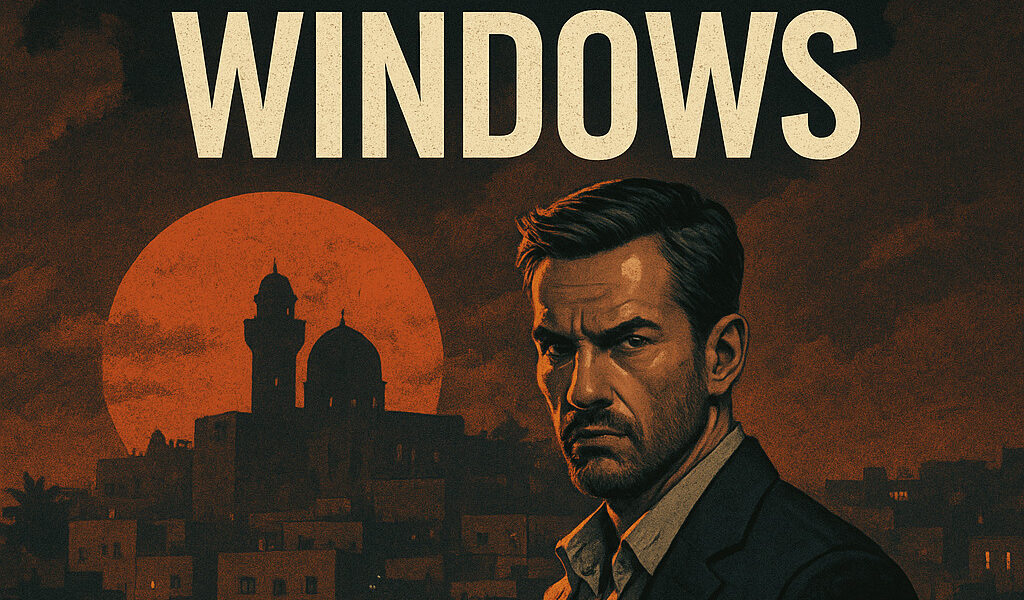The apartment was dark except for the wash of green and gold from Nora’s laptop screen.
Outside, the Larnaca night deepened, quiet streets interrupted only by the occasional scooter, the soft clink of glasses from an upstairs balcony, the distant sigh of the sea.
Alon stood by the window, unmoving, watching a man across the street light a cigarette with one hand and cradle a phone in the other. The glow of the flame blinked once, twice. Then disappeared.
Signal code. Three flashes.
He didn’t recognize it.
He stepped back from the window, drawing the curtains slowly. The apartment wasn’t meant for comfort. It was a listening post. Bare floors, blackout drapes, a kitchenette that smelled faintly of bleach and metal.
There were no windows in the back room. No mirrors. Just a single bed and a table bolted to the floor.
That’s where Nora had spread the printed frames from the surveillance footage. One image per sheet. Black and white, raw, silent.
Leah, walking through port control. Unhurried. Alone.
“She didn’t run,” Nora said. “She walked through the checkpoint like she was cleared. No alias. No attempt to avoid the cameras.”
Alon stared at the images, jaw tight.
“She wanted to be seen.”
“Or someone wanted her seen.”
Nora turned to him. “You think it’s a signal?”
“I think it’s bait.”
She exhaled. “Why now? Why Cyprus?”
Alon walked to the table and picked up the clearest image. Leah’s face was partially obscured by her hair, wind-blown across her cheek. But her eyes, those didn’t change.
“I trained her to disappear,” he said quietly. “This? This isn’t her.”
Nora sat down, folding her arms.
“She was in Tehran two years ago,” she said. “We have footage. Shadowed. Broken transmission. She was following someone, Koren’s trail. Then she vanished. Again.”
Alon said nothing.
She looked at him.
“You blame yourself.”
“I buried her memory,” he said. “Turns out, I just gave it room to breathe.”
Later, Alon descended into the lower quarter, where the city fell into older bones. Streets paved with stone. Rusted gates. The kind of alleys where the ghosts Hadrian mentioned still wandered, draped in civilian flesh and guarded silence.
He entered a bar through a side door, low ceiling, blue smoke curling from incense and cigarettes. A backroom off the kitchen had been secured earlier through old contacts. The owner owed favors to people who didn’t write them down.
Inside: a man waited. Lean, bald, a silver chain at his wrist. Greek-Cypriot intelligence, retired. Name: Spiros.
“Still chasing shadows?” the man asked as Alon sat across from him.
“They’re not shadows if they bleed.”
Spiros smirked. “You want movement logs. Port traffic. Outbound cargo manifests.”
“And anyone using state clearance who shouldn’t have it.”
“Risky ask.”
“Worth it.”
Spiros took a sip from his glass. “There’s a list. Small. Tidy. Unusual credentials activated three days ago. From Jerusalem. Non-diplomatic. But the ID was valid.”
He handed Alon a slip of paper.
One name.
Yael Rimon.
Alon felt something shift in his chest.
“Didn’t she, ”
“Die in Vienna, yes,” Spiros said. “Another ghost, it seems.”
Alon folded the paper slowly. His hands felt heavy.
Outside, thunder rolled across the sky in the distance, far out over the sea. The kind of thunder that didn’t bring rain, just reminders.
Back at the apartment, Nora had drawn diagrams on the whiteboard, lines connecting faces, locations, timestamps.
He handed her the slip.
She read the name.
Then looked up.
“She was part of the Barak Echo project.”
“One of the firewall architects.”
“She was dead, Alon.”
“They’re all dead. Until they’re not.”
Nora leaned back, staring at the ceiling like she could see through it.
“This isn’t an operation,” she whispered. “It’s a resurrection.”
They didn’t sleep that night.
And somewhere beyond the sea, in a room with no windows, a woman who should not exist watched a terminal screen blink silently as coordinates pulsed to life.

